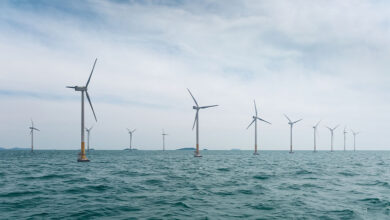Green procurement
 Seven categories of State purchasing have been identified for greening. eolas outlines the draft national green public procurement action plan.
Seven categories of State purchasing have been identified for greening. eolas outlines the draft national green public procurement action plan.
The Government is expected to publish a green public procurement (GPP) action plan in November. Sixty-one submissions were received during public consultation on a draft plan.
In May, Environment Minister Phil Hogan launched a draft GPP action plan, emphasising the role public sector bodies can play “in promoting green procurement, as we put Ireland on the path to a low-carbon, competitive and successful economy.”
The European Commission’s ‘Public Procurement for a Better Environment’ proposed governments reach a 50 per cent GPP target from 2010 onwards, and was supported by the European Council.
The draft action plan outlines seven product groups where half of the total value of public procurement will come from green purchasing, and half of procurement contracts will include green criteria: construction, energy, food and catering services, transport, cleaning products and services, paper, and uniforms and other textiles. The 50 per cent targets will eventually apply to all procurement.
A list of action plans are contained for each category. Significant targets include:
• all public bodies to purchase or lease only buildings with Building Energy Ratings of B3 or better (to increase to A3 in time);
• procurement of equipment or vehicles exclusively from products listed on the Triple E register (or which satisfy SEAI’s energy efficient criteria);
• 50 per cent of meat, poultry, eggs and seafood to be sourced from recognised accredited schemes with a significant sustainability element or an organic scheme;
• requirements of the Clean Vehicles Directive to be communicated to all public procurement officials;
• more than 50 per cent of cleaning products to have green credentials;
• public bodies to refer to the National Procurement Service’s (NPS) guidelines on ethical working standards, European Commission guidelines on socially-responsible public procurement and the International Organisation for Standardisation’s social responsibility standard (ISO 26000) when purchasing uniforms or textiles.
At present, environmental and sustainable criteria in public procurement emanate primarily from EU regulations, e.g. the Eco-Design for Energy-Related Products Directive, the Waste Directive, and the Waste Electrical and Electronic Equipment Directive. Domestically, a 2009 guidance note from the Department of Finance stated that future capital project appraisals should take explicit account of associated greenhouse gas emissions in assessing the cost of a project.
The 2004 EU directives on public procurement allow for purchasing on the basis of most economically advantageous tender (as an alternative to the lowest price). Environmental criteria can be used in this provided they are mentioned in the tender, relate to the subject matter, are objectively quantifiable and verifiable, and the criteria are weighted.
In 2010 €15.1 billion was spent by the State on goods, services and works (representing 12 per cent of GNP), i.e. €6 billion in capital spending and €9.05 billion on goods and services.
According to the draft plan, the next steps will include a GPP action plan contact group, which will include the Department of the Environment, Community and Local Government, the NPS and other stakeholders. This group will monitor and oversee the plan and report annually. The action plan will be renewed every five years. Ongoing research into GPP methodologies will be performed by rx3, the Government’s market development programme (for promoting domestic recycling of materials recovered in Ireland).
Increased emphasis on green public procurement will mean “individual sectors are likely to require the development of more detailed implementation plans to meet the requirements of their specific sectors.”
In its response, employer group IBEC stated that green considerations in procurement should only apply where it is cost-efficient and provides value for money. Irish Corporate Leaders on Climate Change welcomed the draft plan, saying it had real strengths e.g. the promotion of life-cycle thinking.





